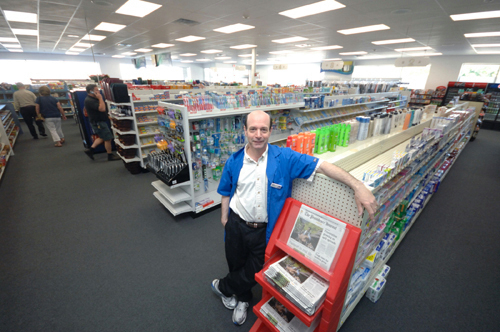
Marc Rittner and his brother Joel just completed the new, multimillion-dollar Wakefield Prescription Center in South Kingstown. Next door is a Rite Aid pharmacy. Drive – or walk – less than one-tenth of a mile and stumble across one of the busiest CVS Caremark Corp. stores in the country.
But the Rittner brothers remain confident in their ability to compete.
“It doesn’t scare us because there are a lot of people that don’t want to support big business,” Marc Rittner said. “They’re disgruntled. They feel like they are a number.”
Wakefield Prescription Center opened its new home across the street from its former location in early April. The two-story building offers 6,000 square feet on the first floor, a pharmacy and frontage on a heavily trafficked road across from a busy post office.
But Rittner and other independent pharmacists say their customer service sets them apart from billion-dollar chains that enter the retail landscape with big muscles and a determination to outmaneuver their competitors.
“Customer service is everything in this business,” said Charles Rossi, a pharmacist and owner of Phred’s Drug in Cranston. “Customers have a million choices. My customers drive by a half-dozen stores to get to me, but if you treat them right they’ll treat you right.”
Phred’s sits across the street from a Walgreens and a CVS of similar size. But Rossi, whose father Michael started the business in 1956, said he offers what no chain can. Rossi will mail prescriptions to those on vacation or spending the winter in a warmer climate. He’ll also accept IOUs from customers down on their luck but in need of critical medication.
In South Kingstown, pharmacist Marc Rittner will keep his store open if a customer calls after realizing late in the day the prescription bottle is empty. He greets his customers by name and will special order hard-to-find medications.
“We feel people who come to us appreciate a little bit more personal effort,” Rittner said.
Ronald Jordan, dean of the University of Rhode Island College of Pharmacy, said independent pharmacies need to emphasize customer service to compete with chains. The profit margin for drugs is almost identical across the board, so independents need to leverage the personal touch.
“When you go into any one of these stores you’ll find they’re doing something very special for people,” Jordan said.
Executives at drugstore chains have taken notice. Rossi said chains have offered on multiple occasions to buy him out, sometimes offering substantial sums of money.
Worries about a large chain manipulating the local real estate market led Rittner and his brother, also a pharmacist, to build the new building. The landlord for their former store was preparing to hand the strip mall to his children. The Rittner brothers worried that a large competitor would jump in with an offer to buy or try and reach an agreement with new owners that would push out Wakefield Prescription Center.
So the brothers purchased an old automobile shop across the street, demolished it and erected their new store. In the process they traded the 1970s-style look of their former home for a shiny 21st-century look.
In Cranston, Rossi is constructing a 2,000-square-foot addition to expand his pharmacy, now busy with work supplying prescriptions to nursing and group homes.
But for all the success, independent pharmacies are facing a difficult time and substantial competition. Rossi said in the 1980s, more than 200 independent pharmacies called Rhode Island home. Today, the number hovers around 40.
Competition is also steep. CVS and Rite Aid each operate more than 30 stores in the Ocean State and Walgreens more than 15 stores. They can also waive lucrative contracts in front of recent pharmacy graduates.
But Jordan, the college dean, said the graduates who go into business for themselves stand to earn more over the long term. URI graduates could make around $100,000 annually working for a chain like CVS, Jordan said. The same graduate could stand to make between $250,000 and $500,000 a year running their own pharmacy.
In Rhode Island alone, Jordan said he knows of about five independent pharmacists looking to retire in the next few years, providing a perfect opportunity for a recent graduate who has gained some experience in the business to take over. In an attempt to spark interest, the dean recently helped restart a National Community Pharmacists Association campus chapter. The first meeting attracted about 25 students.
Jordan said that, on average, fewer than a handful of graduating students each year go to work for independent pharmacies. The vast majority work at a chain store or a pharmacy housed within a health care institution.
Often students who head to independent stores do so because of a family connection. Marc Rittner’s son is studying business and could someday take over Wakefield Prescription Center. Rossi’s sons, both pharmacists, are preparing to take over the business from him.
Rossi said the potential to hand the business to a third generation, and hopefully more, kept him arriving at the store every day at 6 a.m. and fending off offers from the competition to purchase the business.
“My kids are going into the business, this is their future,” Rossi said. •












